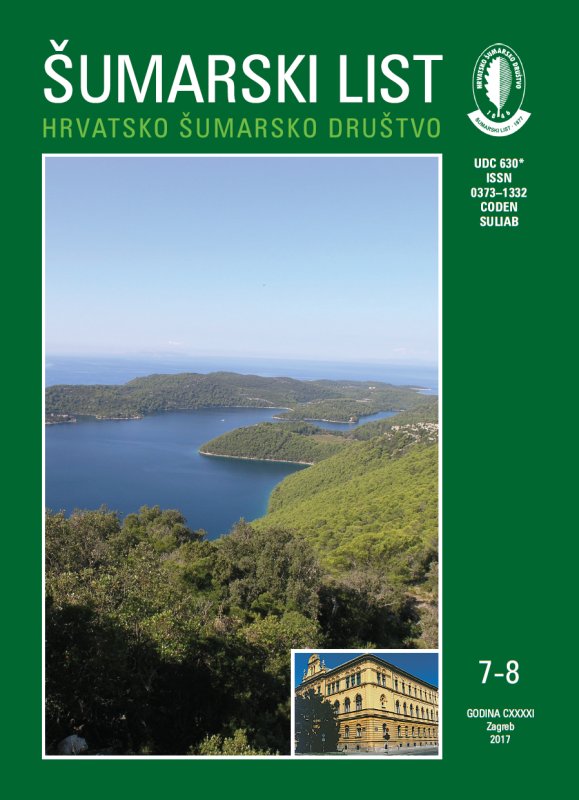
broj: 7-8/2017
pdf (25,6 MB) |
|
||||||||||||||
| RIJEČ UREDNIŠTVA | ||
| Uredništvo | ||
| ON THE 20TH ANNIVERSARY OF THE DAY OF CROATIAN FORESTRY pdf HR EN | 337 | |
| IZVORNI ZNANSTVENI ČLANCI | ||
| Ante ŠILJEG, Ivan MARIĆ, Mladen JURIŠIĆ, Ivan PLAŠČAK | UDK 630* 165 (001) https://doi.org/10.31298/sl.141.7-8.1 | |
| VIEWSHED MODEL AS A STRATEGY FOR PREVENTION OF FOREST FIRES – CASE STUDY OF ZADAR COUNTY pdf HR EN | 339 | |
| Dalibor BALLIAN, Ute TRÖBER | UDK 630* 165 (001) https://doi.org/10.31298/sl.141.7-8.2 | |
| GENETIC CHARACTERIZATION OF EUROPEAN BLACK POPLAR (Populus nigra L.) IN BOSNIA AND HERZEGOVINA pdf HR EN | 351 | |
| Summary European black poplar represents one of the ecologically most important tree species of alluvial forest association. In some countries, the potential of this species for forest management is significant. As in most countries of central Europe they have been drawn back in Bosnia and Herzegovina in the past and this has remained to date. In the present conditions in BiH, there is a potential to established and grow poplar forests on areas of 40,000ha, in small pure units and mainly mixed with willow and other hydrophilic species. As a peculiarity in BiH, beside black poplar there is a population of hairy black poplar (P. nigra subsp. caudina). To protect the genetic resources of Populus nigra in BiH, a clonal archive with 163 clones selected in several autochthonous localities has been established at the location žepče. In total 141 of these clones were sampled for genotyping with 10 microsatellite markers. According to their origin, they were assigned to 11 populations with respect to the catchment areas of the main rivers. The aim of the study is to describe genetic structure, diversity and differentiation of populations of black poplar from the river deltas in BiH, and to emphasize the importance of knowledge of these structures in the processes of regeneration and conservation of this species. Sample sizes of the populations are in general very small, they reach from seven with only three different genotypes (upper stream of Vrbas river) to 20 with 19 genotypes (in upper stream Bosna river). Consequently, the number of detected alleles over 10 loci is lowest in population upper stream Vrbas with 29 and highest in upper stream Bosna river with 81 alleles. Beside population upper stream Vrbas with only three genotypes, low values of genetic multiplicity and lowest values of genetic diversity shows population lower stream Neretva, although represented by 14 multilocus genotypes. The observed as well as the expected heterozygosity are much lower in this population than in all other populations, too. This special structure might occur due to its isolated location and the fact, that this is the population with the hairy black poplars. By means of cluster analysis, it is demonstrated that the genetic structures of this population apparently differs from the others, but differences between the river populations are also indicated. The parameters of genetic variation of all other populations are in a similar range. The values of genetic distance and differentiation between populations show, that differences between the populations from the same river are on average smaller than between populations from different rivers and that the three populations from the river Bosna represent the gene pool of black poplar in BiH best. After exclusion of the two extreme populations, a principal coordinate analysis based on genetic distances illustrates that more clearly. These results can be used as a basis for planning and realization of measures for the conservation of the genetic resources of black poplar in Bosnia and Herzegovina. | ||
| Ebru BILICI,Mehmet EKER,Mesut HASDEMIR, Abdullah E. AKAY | UDK 630* 433 + 379 (001) https://doi.org/10.31298/sl.141.7-8.3 | |
| ASSESSMENT OF POST-FIRE SALVAGE LOGGING OPERATIONS IN MEDITERRANEAN REGION OF TURKEY pdf HR EN | 363 | |
| Erhan ÇALIŞKAN, Uzay KARAHALIL | UDK 630* 614 + 360 (001) https://doi.org/10.31298/sl.141.7-8.4 | |
| HARVEST SCHEDULING AND OPERATIONAL PLANNING FOR MOUNTAINOUS AREAS: A CASE STUDY FOR IKISU PLANNING UNIT pdf HR EN | 375 | |
| PRETHODNO PRIOPĆENJE | ||
| Osman MUJEZINOVIĆ, Mevaida MEŠAN, Mirza DAUTBAŠIĆ, Kenan ZAHIROVIĆ | UDK 630* 453 https://doi.org/10.31298/sl.141.7-8.5 | |
| MONITORING OF POPULATIONS OF BROWNTAIL MOTH (Euproctis chrysorrhoea L.) IN THE CENTRAL BOSNIA pdf HR EN | 387 | |
| PREGLEDNI ČLANCI | ||
| Matija LANDEKIĆ, Ivan MARTINIĆ, Matija BAKARIĆ, Rosa M. RICART, Mario ŠPORČIĆ | UDK 630* 969 https://doi.org/10.31298/sl.141.7-8.6 | |
| VOCATIONAL TRAINING OF WORKERS IN THE FORESTRY SECTOR – THE SITUATION IN CROATIA AND TRENDS IN EUROPE pdf HR EN | 395 | |


